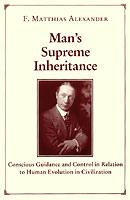


F. M. Alexander's Man's Supreme Inheritance (Mouritz edition)
Reviewed by Kevin Ahern
We get to see F. M.'s thinking develop at this crucial time, which included World War I, his first trip to America, and his development of a new inhibitory use of his hands in teaching.
It is a real pleasure to be invited to write a review of Jean Fischer's new edition of F. M. Alexander's Man's Supreme Inheritance (published by Mouritz Press, Foreword by Walter Carrington). This follows the same editor's and press’ publication in July of 1995 of F. Matthias Alexander Articles and Lectures. One can only hope that Fischer and Mouritz plan to re-publish the rest of Alexander's writings, because these two volumes are remarkable for their comprehensive content and attention to detail. Articles and Lectures is the first published compilation of F.M.'s articles, published letters and lectures on his Technique. Thirty separate pieces are included, ranging in time from 1894 to around 1950, a number of which, to this reader's knowledge, have not been readily available. (1) Each separate piece has its own brief introductory history and commentary. The extensive and fascinating Notes and References are almost a work in themselves. To have all this gathered together in one volume makes this a treasure chest worth continued re-reading for those eager to investigate the evolution of Alexander's thinking regarding his work. One teacher has described it as “the fifth Alexander book.”
The new Man's Supreme Inheritance (hereafter MSI) is a gem of the same strand in that it can be inserted (chronologically) between Parts 1 and 2 of Articles and Lectures. We get to see F. M.'s thinking develop at this crucial time, which included World War I, his first trip to America, and his development of a new inhibitory use of his hands in teaching. The same attentive editing is evident. There is a complete, meticulous history of the different editions and printings of this book and even a section by section textual comparison between the 1910 and 1918 editions. (2) A varied selection of reviewers' responses to both of these additions is included in the Appendices.
What strikes me on this particular, personal revisiting of F. M.'s writings is the leap he has made. In the early articles (1894-1910) his emphasis is on the curative and restorative aspects of the Technique. The emphasis is continued and included in MSI but it is subsumed under the much broader emphasis on the importance of the adoption of the principles of conscious guidance and control to the successful growth (evolution) of the human race, as individuals and as a species. Alexander has re-understood the whole theory of evolution in the light of his work. John Dewey, who of course wrote the Introduction to the 1918 edition of MSI, refers twice specifically to it in his chapter on Habits and Will early in his own work, Human Nature and Conduct (1922). Later in that same book, Dewey discusses the ethical import of the doctrine of evolution:
“In fact evolution means continuity of change; and the fact that change may take the form of present growth of complexity and interaction. Significant stages in change are found not in access of fixity of attainment but in those crises in which a seeming fixity of habits gives way to a release of capacities that have not previously functioned: in times that is of readjustment and redirection.” (3)
Such a strenuous process of growth and revitalization can most certainly be aided by study of texts such as those discussed in this review; (4) which all involved in this work can, in common, investigate, discuss, and refer to. Again, thanks to Jean Fischer and Mouritz Press. Please give us more quality re-issues of Alexander's works.
(1) The editor even notes that at least two specific papers are missing and that many more may appear.
(2) Again, what is not known or certain is noted as carefully as what is thought definitive.
(3) John Dewey: The Middle Works, 1899-1924, Volume 14, P. 197. Southern Illinois University Press.
(4) Both Articles and Lectures and the new edition of MSI are available from Mouoritz.
Copyright 1997 Kevin Ahern
About the Author
Kevin Ahern trained with Joan and Alexander Murray from
1977 to 1980 at the Urbana Center for the Alexander Technique. He
has taught the Technique in Wisconsin, Michigan, and Seattle,
Washington. He currently resides in and maintains a private
teaching practice in Kaneohe, Hawaii.
Contact the author Kevin Ahern
Man's Supreme Inheritance is available from:
Mouritz Press (UK)
Links
John Dewey and the Alexander Technique
Back to
Book Reviews Index
Alexander Technique: The Insiders' Guide
Alexander Technique: The Insiders’ Guide
maintained by Marian Goldberg, MSTAT
Alexander Technique Center of Washington, D.C.
info@alexandercenter.com